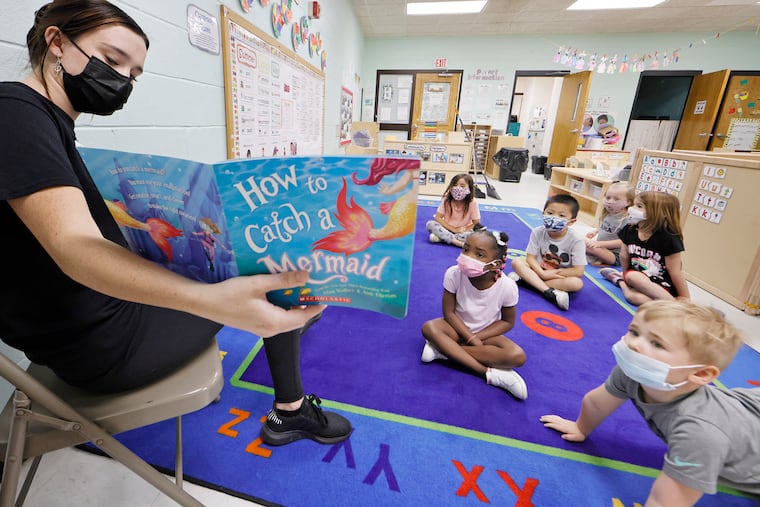Look to Philadelphia for smart ways to invest new early learning funds | Opinion
Philadelphia is home to programs that are ready-made for expansion with new federal funding.

President Joe Biden’s American Families Plan, now being debated in Congress, proposes $225 billion to improve access to affordable, high-quality child care and $200 billion to expand preschool that prepares 3- and 4-year-olds for kindergarten. These investments would represent historic commitments to America’s present and future. Philadelphia has models in place that can show the country effective ways to use any new funds.
The president is right to focus on the quality, affordability, and availability of early learning programs. This is a “win-win” for our country: high-quality programs educate the next generation for success and create opportunities for adults in the workforce. These opportunities are sorely needed as we rebuild from the impacts of COVID-19 and chronic underinvestment in supporting children and families.
» READ MORE: Child tax credit is fine, but what we really need is to value caregiving | Opinion
America’s — and Philadelphia’s — early learning “system” for children under age 5 is a patchwork of independent providers and small networks. Filled with smart and committed educators, early learning is ripe for more investment.
To strengthen the early learning system in Philadelphia, the William Penn Foundation, alongside city government, early learning program providers, nonprofits, teachers, families, higher education, and local and national philanthropies, has focused on increasing access to high-quality early learning for Philadelphia children under age 5.
And we have seen success. The availability of high-quality early learning in Philadelphia has increased 50% since 2014. This change is the result of collaborative efforts focused on quality improvement initiatives, financing for high-quality programs to sustain or expand, workforce development to ensure that we have more well-prepared teachers, and increased subsidies for families to access high-quality programs.
Today, about 35% of all available child-care seats in Philadelphia are rated high quality, up from 25% in 2014. Despite our progress, only about 50% of the children most in need have access to a high-quality publicly funded pre-K program. Statewide, only about 36% of children have access. The need is urgent to support the next generation.
Fortunately, Philadelphia is home to programs that are ready-made for expansion with new federal funding and can demonstrate how to effectively improve quality, access, and affordability. Some examples include:
Quality improvement: A pair of programs, led by local early care and education champion First Up and the Kimble Group, support educators to improve curriculum, student-teacher interaction, and classroom environment. These programs, known as EQUIP and Aspire to Inspire, have supported almost 100 early learning programs to make measurable gains in quality. Alongside others, these programs also provide guidance on business management to help early learning programs sustain high quality and a healthy financial position so they can continue to serve families. After months of mandatory closures and reduced enrollment due to the pandemic, this was never more important.
Financing: With inordinately narrow operating margins, high-quality programs need access to low-cost financing to expand the size of their facilities or open new locations in neighborhoods that lack sufficient high-quality programs. They also need access to low-cost capital to address occasional needs such as roof or plumbing repair. The Fund for Quality and the Philadelphia Early Childhood Education Loan Fund, run by Reinvestment Fund and Public Health Management Corp. (PHMC), have created or preserved more than 3,200 high-quality child-care seats.
» READ MORE: Why doesn’t the U.S. value child care? A historic look.
Workforce development: The Early Childhood Education Apprenticeship Program, run by the District 1199C Training & Upgrading Fund, focuses on ensuring educators are well-prepared and more fairly compensated (though the issue of staff compensation throughout early learning needs much more attention). The program has already supported 33 early learning staff in Philadelphia to attain college degrees and career advancement while working in a classroom, with 33 more apprentices in the pipeline. For high school students interested in a career in early learning, Parkway West High School and Philadelphia Academies are helping students finish high school with a career credential and a start on college degrees.
Family subsidies: The cost of high-quality early learning programs is simply out of reach for many families. Programs like PHLpreK, begun by the city in 2017, make high-quality pre-K programs available at no cost. Serving 4,000 children this year, the program has made it possible for more than 10,000 children ages 3 and 4 to attend pre-K at over 140 centers throughout Philadelphia. More children need similar opportunities.
Good things are happening in Philadelphia’s early learning community. Not only could these programs expand to make early learning available to thousands more Philadelphia children, but national leaders can use them as models for investments across the country.
Elliot Weinbaum is program director for William Penn Foundation’s Great Learning grant-making program and a product of Philadelphia public schools.